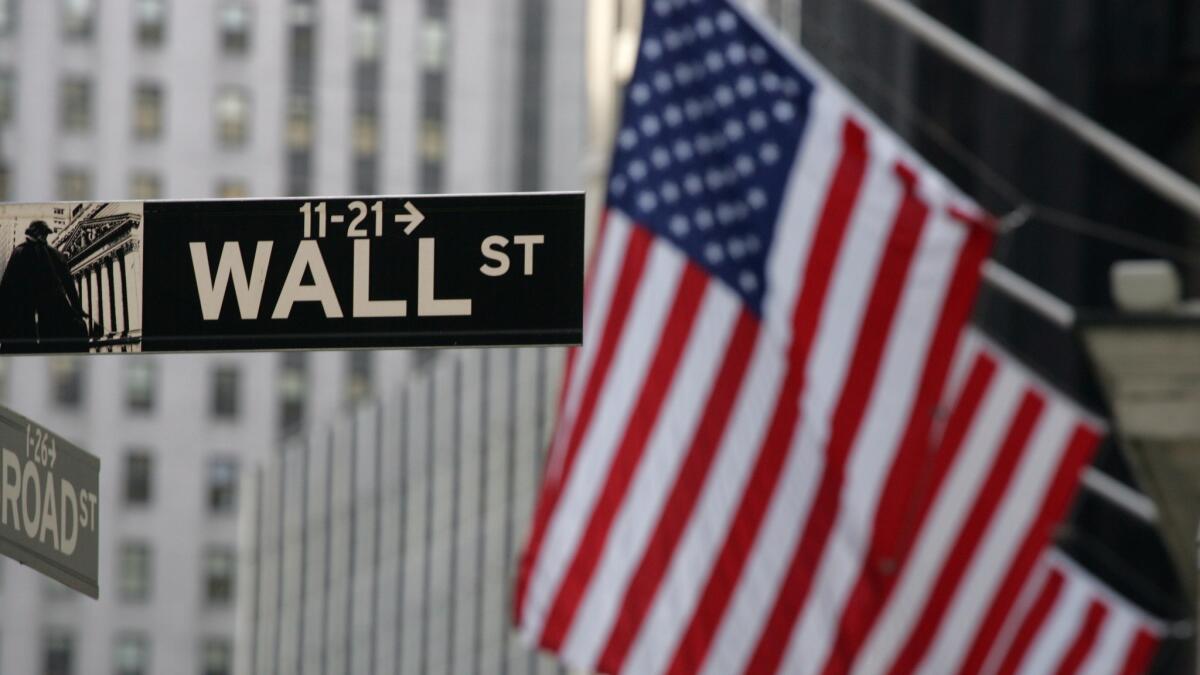Stocks have a listless day; Snap drops nearly 9%

- Share via
Wall Street had another day of listless trading Tuesday, with major stock indexes finishing nearly unchanged.
Gains in energy and technology companies were canceled out by losses among banks, phone companies and other sectors.
A rebound in crude oil prices helped lift energy stocks, which led the gainers. Banks posted the largest losses.
Snap, the Los Angeles company behind disappearing-message app Snapchat, slumped 8.9% to $15.47 the day after it closed below its IPO price of $17.
Overall, investors were making modest moves ahead of Federal Reserve chief Janet L. Yellen’s testimony before Congress on Wednesday and Thursday, and the release of the Fed’s beige book, an economic snapshot used by the central bank to gauge U.S. economic trends.
The market will key in on both as it tries to discern how Fed policy on interest rates may play out this year and next, said Sameer Samana, global quantitative strategist for the Wells Fargo Investment Institute.
“Any time you have those types of potentially market-moving events, especially with policy being such a big focus right now, people are always a little hesitant” to make big market moves, Samana said.
The Standard & Poor’s 500 index fell 1.90 points, or 0.1%, to 2,425.53. The Dow Jones industrial average inched up 0.55 of a point to 21,409.07. The Nasdaq composite rose 16.91 points, or 0.3%, to 6,193.30. The Russell 2000 index of smaller-company stocks rose 4.58 points, or 0.3%, to 1,413.05.
Nine of the 11 industry groups in the S&P’s 500 index declined. More stocks rose than fell on the New York Stock Exchange.
Bond prices rose. The yield on the 10-year Treasury note fell to 2.36% from 2.38%.
The major indexes got off to an uneven start, then veered sharply lower before midday as news broke that President Trump’s oldest son, Donald Trump Jr., had released an email chain from last year that shows the Trump scion discussing plans to hear damaging information on Hillary Clinton from what was described to him as a Russian government effort to aid his father’s campaign.
The news stoked investor worries over whether the headlines could lead to more political uncertainty in Washington and potentially delay tax cuts, regulatory reform and other business-friendly policy initiatives that the market has been expecting. But the market mostly bounced back from the stumble by the end of the day.
Mostly, investors appeared to be taking a wait-and-see approach ahead of Yellen’s two-day appearance before Congress.
Starting Wednesday, traders will be listening for clues as to how aggressively the Fed will continue to raise rates and start to unwind its big bond-buying program. The latest U.S. economic reports, particularly for jobs, have been upbeat.
“Our base-case scenario for the rest of the year is we’ll get one additional hike likely toward the end of the year,” said Nadia Lovell, U.S. equity strategist at J.P. Morgan Private Bank.
Investors were also looking ahead to the corporate earnings reporting season, which ramps up this week. PepsiCo served up its results early Tuesday. Delta Air Lines, JPMorgan Chase and Wells Fargo are among the big companies due to report their latest quarterly results this week.
“People are waiting to get more clarity with earnings kicking off in earnest with the banks on Thursday and Friday,” Lovell said. “Financials and banks usually give the best barometer on the economy itself.”
Energy-sector companies led the gainers Tuesday. Devon Energy rose 2.7% to $30.53. Newfield Exploration advanced 1.8% to $26.83.
Financial companies took heavy losses. T. Rowe Price Group slid 2.5% to $75.16. Invesco declined 2.1% to $35.72.
PepsiCo reported better-than-expected quarterly results as higher prices for drinks and snacks boosted both profit and revenue for the beverage and packaged foods company. PepsiCo’s sales volumes in North America were soft, however. That appeared to weigh on the company’s shares, which fell 0.5% to $113.74.
Rent-A-Center climbed 8.9% to $12.09 after the rent-to-own company’s board of directors rejected a takeover offer of $15 a share from Vintage Capital Management.
Energy futures closed broadly higher. The price of oil rebounded after dipping earlier in the day. Benchmark U.S. crude rose 64 cents, or 1.4%, to settle at $45.04 a barrel. Brent crude, used to price international oils, rose 64 cents, or 1.4%, to $47.52 a barrel.
Wholesale gasoline rose 2 cents to $1.52 a gallon. Heating oil rose 2 cents to $1.48 a gallon. Natural gas rose 12 cents, or 4%, to $3.05 per 1,000 cubic feet.
Gold rose $1.50 to $1,214.70 an ounce. Silver rose 12 cents to $15.75 an ounce. Copper rose 2 cents to $2.67 a pound.
Major markets overseas were mixed. Germany’s DAX lost 0.1%, while France’s CAC40 and Britain’s FTSE 100 each slid 0.5%. Japan’s Nikkei 225 index gained 0.6% on expectations that the yen will weaken further against the dollar as the central bank strives to keep long-term bond yields low. Hong Kong’s Hang Seng jumped 1.5%. The Kospi in South Korea climbed 0.6%.
The dollar fell to 113.84 yen from 114.05 yen. The euro strengthened to $1.1476 from $1.1403.
More to Read
Inside the business of entertainment
The Wide Shot brings you news, analysis and insights on everything from streaming wars to production — and what it all means for the future.
You may occasionally receive promotional content from the Los Angeles Times.










